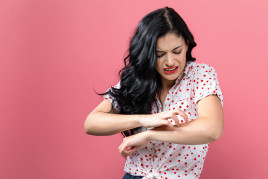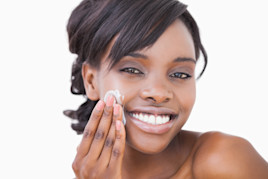November is National Healthy Skin Month®
What is National Healthy Skin Month?
The American Academy of Dermatology (AAD) designates each November as National Healthy Skin Month
It’s a time to pay attention to your skin, learn about skin care, and adopt habits that can lead to a lifetime of healthier skin, hair, and nails.

The AAD launched the first National Healthy Skin Month in November 1997. Since then, it’s become an annual event in which the AAD and dermatologists:
Emphasize the importance of good skin care.
Share tips that can lead to healthier skin, hair, and nails.
Ask Americans to take time to pay attention to their skin and adopt healthy habits to care for their skin, hair, and nails.
Who can participate in National Healthy Skin Month?
Everybody needs good skin care — from newborns to people more than 100 years old. That’s why National Healthy Skin Month is everyone’s awareness month.
To help you keep your skin looking its best, this November, the AAD offers dermatologists' insight about five trends that you may have seen on social media.
5 trends you need to know about
Trends that you see on social media and elsewhere can seem like the perfect solution for younger looking skin, healthier nails, and restoring lost hair. Keep in mind that not every trend is suitable for everyone. Some of these trends may even be harmful.
To protect your health, here are the facts dermatologists want you to know about five popular trends:
Skipping sunscreen
What dermatologists tell their patients: There is no evidence that sunscreen causes skin cancer. “Current scientific evidence does not show that any of the ingredients in sunscreen are harmful to human health,” says board-certified dermatologist Amit Om, MD, FAAD.
“What we know for certain is that unprotected sun exposure increases your risk of developing skin cancer,” adds Dr. Om.
That's why dermatologists recommend that you protect your skin by:- Seeking shade
- Wearing sun-protective clothing
- Applying broad spectrum, water-resistant sunscreen with SPF 30 or higher to all skin not covered by clothing
Russian manicures
Also called a dry or waterless manicure, a Russian manicure skips the usual nail-soaking step. Instead, the person giving the manicure uses an electric file to clean, shape, and work on the nails and cuticles.
The purpose of a Russian manicure is to make your nails look longer by removing the cuticle and skin surrounding the nail.
What dermatologists tell their patients: “I caution my patients against this type of nail care technique, because the cuticle acts as a protective barrier. Removing the cuticle puts you at risk for an infection,” says board-certified dermatologist Samantha Karlin, MD, FAAD. Dr. Karlin adds that after a Russian manicure, dermatologists “tend to see patients with paronychia, a type of infection that causes the skin around your nail to become inflamed, painful, and discolored.”Glass skin
This skin care trend is designed to make skin look smooth, clear, and pore-less by keeping the skin as moisturized as possible.
The steps to achieving this look include using a gentle cleanser, hydrating serum, and moisturizer, along with exfoliating, all while making sure to protect your skin by using sunscreen.
It's said that doing this can minimize the appearance of lines.
What dermatologists tell their patients: “Certain aspects of the glass skin trend like moisturizing your skin and using a broad-spectrum, water-resistant sunscreen with an SPF of 30 or higher are positive steps toward better skin care habits,” says Dr. Karlin. “But the glass-skin look might not be realistic for everyone. Some people may run the risk of using too many products, which can lead to issues like clogged pores, irritated skin, and breakouts. That’s why it’s important to think about everything in moderation as you’re customizing your skin care routine. Keep in mind that a dermatologist can help recommend a skin care routine that works best for your skin type,” says Dr. Karlin.Biotin (vitamin B7) for hair loss
What dermatologists tell their patients: “There's no strong evidence to suggest that taking a biotin supplement will treat hair loss in people who do not have a biotin deficiency,” says Dr. Om.
Here’s what you need to know:- “Before taking any supplement for hair growth, you need to find out if you're getting enough of that vitamin or mineral. A blood test can determine if you are deficient,” says Dr. Om.
- “You should only take a biotin supplement if your blood test shows that you are deficient,” adds Dr. Om.
- The U.S. Food and Drug Administration (FDA) warns that having too much biotin in your blood can interfere with certain medical tests, giving you and your doctor incorrect results. Getting an incorrect result could be harmful to your health.
“It’s important to talk to a board-certified dermatologist about any underlying medical conditions you might have before starting any supplements for your skin, hair, and nails. Your dermatologist can advise of the safety of the ingredients and determine if a supplement will address your concerns, or if there is a better option,” says board-certified dermatologist Lauren Taglia, MD, PhD, FAAD.

Beef tallow to treat acne and other skin issues
What dermatologists tell their patients: You may have heard that beef tallow is a natural and inexpensive way to treat acne, dry skin, and other skin issues. However, dermatologists caution against using beef tallow instead of proven skin care products, such as moisturizers and acne treatments. Here’s why:- If you have acne-prone skin, beef tallow may worsen acne by trapping oils and debris in your skin.
- Beef tallow cannot protect your skin from the sun. Dermatologists recommend applying broad-spectrum, water-resistant sunscreen with an SPF 30 or higher to exposed skin whenever you’re outdoors.
- While the FDA regulates beef tallow as a food, the FDA doesn’t regulate it for skin care. This means that applying beef tallow to your skin can increase your risk of developing an allergic reaction or irritated skin.
- Stored improperly, beef tallow can become contaminated with bacteria.
Your dermatologist knows skin, hair, and nail care
Harmful advice can take a toll on your skin, hair, or nails and sometimes your self-esteem. A good way to tell if the advice is trustworthy is to look at who’s giving it. If the advice comes from a board-certified dermatologist (an FAAD), you know it comes from the skin, hair, and nails expert.
You’ll find trustworthy advice from board-certified dermatologists on this website. For daily tips from board-certified dermatologists, follow the AAD on social media, using the links at the bottom of this page.
Related AAD resources
Images
Getty Images
References
@aadskin1 and amitommd:
(2024, August 8) “Should you take biotin to prevent hair loss?”, https://www.instagram.com/p/C-acrdhRvDV/
(2024, July 18) “Have you heard this rumor about sunscreen?”, https://www.instagram.com/p/C9kX1eWx2bS/
American Academy of Dermatology:
“Social media skin care trends: Dermatologists reveal the facts.” News release issued 10/29/2024. Last accessed 10/29/2024.
“Supplement secrets unveiled: Debunking common myths about beauty boosters.” News release issued 9/17/2024. Last accessed 10/15/2024.
U.S. Food and Drug Administration (FDA). “FDA in Brief: FDA reminds patients, health care professionals and laboratory personnel about the potential for biotin interference with certain test results, especially specific tests to aid in heart attack diagnoses.” Last updated 11/5/2019. Last accessed 10/15/2024.
Written by:
Paula Ludmann, MS
Last updated: 10/29/24
 Atopic dermatitis: More FDA-approved treatments
Atopic dermatitis: More FDA-approved treatments
 Biosimilars: 14 FAQs
Biosimilars: 14 FAQs
 How to trim your nails
How to trim your nails
 Relieve uncontrollably itchy skin
Relieve uncontrollably itchy skin
 Fade dark spots
Fade dark spots
 Untreatable razor bumps or acne?
Untreatable razor bumps or acne?
 Tattoo removal
Tattoo removal
 Scar treatment
Scar treatment
 Free materials to help raise skin cancer awareness
Free materials to help raise skin cancer awareness
 Dermatologist-approved lesson plans, activities you can use
Dermatologist-approved lesson plans, activities you can use
 Find a Dermatologist
Find a Dermatologist
 What is a dermatologist?
What is a dermatologist?
